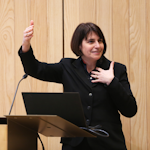For the first time this year, the Keynes Lecture was delivered in a hybrid format, allowing both those at home to attend, and a select audience.
Hélène Rey from LBS delivered a lecture on “Is this Time Different? Financial Follies across Centuries”. The title was a deliberate reference to the very influential book by Carmen Reinhart and Kenneth Rogoff, called “This Time Is Different: Eight Centuries of Financial Folly” which was a comprehensive look at international financial crises that puts more recent economic meltdowns into perspective. It was released in 2009 just after the global financial crisis which underscored the regularity with which such financial crisis tended to occur.
“It was very influential, in that they documented very painstakingly all the crises that have happened in emerging markets in advanced economies for long periods of time and they pointed out that there are indeed some empirical regularities which seem to be popping up across this crisis across these countries now they are not the only ones who have found some regularities in the unfolding of crisis,” says Professor Rey.
In the past there has been analysis by historians in economics which have found there seem to be a few things that happen immediately before a crisis which in turn lead to booms and bust.
“What I'm doing here in this work is to look at all of these factors quite systematically, so I'm going to use a historical database of data that starts in the 19th century and goes until the present time, and use this data to see whether indeed the models that could predict for example the great depressions and other similar crises,” she says. “Not only the US but across the world can also predict a future crisis going forward.”
She notes the relative absence of a major financial crisis in the post second world war period and then the large number of economic meltdowns happening in recent decades. For example in 2000 after the ‘dot com bust’ and of course the Global Financial Crisis starting in 2008. It is this financial crisis which in part has been part of the impetus behind the launch of the Faculty’s new Janeway Institute, which aims to shape young minds and transform economic research.
There hasn’t been a financial crisis since the onset of the pandemic, but she acknowledges some of the current volatility in the market. For example, 2021 was the year of Gamestop mania in January, there have been continued ups and downs in cryptocurrencies, and equity markets peaked at new record highs recently.
In a video interview with Lukas Freund (a PhD Student in Economics within the Faculty) Professor Hélène Rey described her Keynes Lecture, and warned that any methodology that is based on historical data.
“Because of the methodology used, an online machine learning technique will never be able to predict crises of a kind which have never been seen before,” she cautions.
It’s a type of 'known unknown' – we know we will not be able to forecast unusual events that have not been seen before. However, known knowns are possible to predict, and it is this her research is based on. “You can’t predict crises of a kind that are unheard of, but in our current context we do have a lot of information on crises that do repeat on a regular basis.”
“For example, a lot of people are rightly worried about cyber risk,” she says. “This might induce a financial crisis via an attack to repayment systems for example, and I can think of various scenarios where that would pan out.” However, she makes the point that these things have never been seen before; “we never had a systemic crisis due to cyber risk, so my method would just not be able to predict this, and I think by any other framework using the literature similarly, a crisis that would be directly linked to the pandemic would not be predicted because we haven't seen a systemic financial crisis linked to a pandemic.”
However, if a pandemic related shock where to induce certain behaviour by the banking system or asset managers that would be correlated with other types of crisis that have previously been seen then she says; “we could potentially pick it up. Indeed looking forward what has been very specific about the current period has been the extreme valuation of a lot of assets supported by central banking, and for the right reason because we had a huge shock linked to the pandemic and so we have had very rightly fiscal policy and monetary policy being very supportive but as this support is being withdrawn we know that in terms of the impact of financial markets, if support is withdrawn abruptly, or if we have some bad shocks and some bad news this could lead to widening of spreads and changes of valuations of assets which could then lead to more systemic effect so this is definitely something that we have seen before and something to watch for and policy makers are very aware of that.”
Hélène Rey advises policymakers in a variety of roles including in the advisory council to the IMF managing director and as a member of the french macro prudential authority.
The Keynes Fund for Applied Economics promotes innovative and path breaking quality research in economics and finance. A key part of the Faculty of Economics, it provides resources for early stage researchers as well as for established academics in Cambridge, with a special emphasis on understanding key distortions that affect market allocations and create inefficiencies, and on finding policy solutions to correct such inefficiencies.
Each year the Fund hosts the annual Keynes Lecture which in previous years has featured Jean Tirole, Hyun Song Shin and Cristina Romer.








